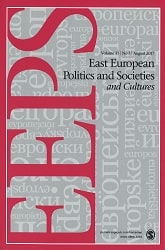Who Governs in the Council? Determinants of Ministerial Participation in Council Meetings
Who Governs in the Council? Determinants of Ministerial Participation in Council Meetings
Author(s): Jan Kovář, Kamil KovářSubject(s): Governance, Government/Political systems, Political behavior, Politics and law, Behaviorism, EU-Accession / EU-DEvelopment
Published by: SAGE Publications Ltd
Keywords: ministers; EU Council; sociological institutionalism; rational-choice institutionalism; participation;
Summary/Abstract: The Council of the EU is the primary institution through which ministers of member states can express their positions on Commission proposals and vote upon legislation. This article first examines the extent to which ministers actually attend Council meetings before moving toward investigating the determinants of ministerial participation in over a period covering almost thirteen years between May 2004 and December 2016. It aims to identify determinants of why ministers from the Visegrad countries participate at some meetings and are absent from others. Using an original data set containing information about 940 Council meetings as well as several country-specific characteristics, we show that, on average, at about four out of every six meetings, ministers are absent. The results of our regressions indicate a pattern in which holding the office of the EU’s rotating presidency, the number of b-points on the agenda, and the size of the government increase the likelihood of ministerial participation in meetings. In contrast, high levels of popular support for Eurosceptic parties and holding of national legislative elections decrease the probability of ministerial attendance. Moreover, meetings of Council formations related to policy areas with a low level of EU competence are significantly less likely to be attended by ministers.
Journal: East European Politics and Societies
- Issue Year: 35/2021
- Issue No: 01
- Page Range: 156-181
- Page Count: 26
- Language: English
- Content File-PDF

